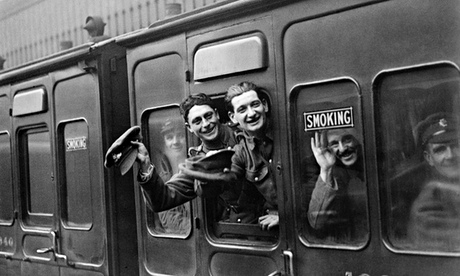
Stay Where You Are & Then Leave is written from the point of view of a young boy, Alfie, who describes how the war affects his life. It is set entirely in England, and concentrates on the impact of the war on the families living on an ordinary London street. Alfie wants to find out what has happened to his father, who enlisted at the beginning of the war but mysteriously then stopped writing, but he is never told the whole truth by his mother who is trying to protect him. When he eventually finds his father, at a hospital for shell shocked soldiers in Ipswich, he does not understand what is happening.
Of course nine year old Alfie knows little more about shell shock than did the doctors at the time. Studying human behaviour (psychology) and mental disorder (psychiatry) were very new sciences at the beginning of the twentieth century, and doctors struggled to understand what was causing this new phenomenon they called "battle fatigue" or "war neurosis". Nowadays we understand "post traumatic stress disorder" much better and soldiers have access to better treatment and support. During the first world war, soldiers could be arrested and often executed for cowardice. If they were injured they may have been sent home to hospital, like Georgie is – but only so they could be 'cured' and returned to battle as soon as possible.
How do you think Jonh Boyne's use of Alfie as a narrator affects the way we read the book and its depiction of shell shock? And similarly, when Alfie sees his father's best friend, Joe – a "conshy" – being attacked in his home, he does not understand why. How might this make us think differently about things we thought we knew about, or shed new light on them?
And did the book overall change the way you thought about the first world war? Taught in schools, the conflict becomes all about the trenches and the military failures. We think about the home front more in the second world war, but the (lack of) understanding of shell shock; the treatment of conscientious objectors; what happened to foreigners living in England; rationing; the constant strain of never knowing where your loved ones were: these were as much a part of the daily life of war as actual fighting. What role should the home front play in the way we remember the first world war?
Email us your thoughts, join the conversation on Facebook or send us a message on Twitter, @GdnChildrensBks.

